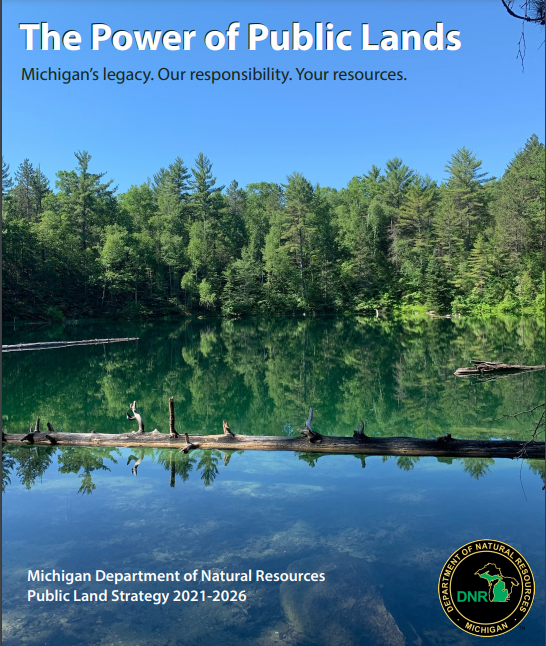Draft of DNR’s 2021-2026 Land Strategy Available for Public Review
 Following a public comment period in 2020, the Michigan Department of Natural Resources (DNR) has released a draft of the updated public land strategy. Originally created in 2013, the public land strategy is used by the DNR to outline management plans for Michigan’s public lands and natural resources to ensure that Michiganders and visitors alike are able to recreate and enjoy public lands in their favorite ways. Michigan has nearly 4.6 million acres of state-managed public land that includes state parks, state game areas, forests and hiking and biking trails, among other components. This plan also assists the DNR in developing conservation strategies and measurable objectives that balance human use of public lands with the management required to keep our natural resources healthy
Following a public comment period in 2020, the Michigan Department of Natural Resources (DNR) has released a draft of the updated public land strategy. Originally created in 2013, the public land strategy is used by the DNR to outline management plans for Michigan’s public lands and natural resources to ensure that Michiganders and visitors alike are able to recreate and enjoy public lands in their favorite ways. Michigan has nearly 4.6 million acres of state-managed public land that includes state parks, state game areas, forests and hiking and biking trails, among other components. This plan also assists the DNR in developing conservation strategies and measurable objectives that balance human use of public lands with the management required to keep our natural resources healthy
The DNR is now encouraging interested Michigan residents to review the first draft of the new 2021 strategy.
Whether you enjoy public lands to hunt, fish, hike, mountain bike or bird watch, the DNR wants to hear from you about any concerns or comments you would like to share regarding the first draft of the updated land strategy. Your input will not only give you the opportunity to share your opinion but will also be a key component of consideration by the DNR as they prepare to approve the new 2021-2026 land strategy.
In order to be reviewed and considered for inclusion in the final land strategy draft, comments on the comprehensive draft public land strategy will be accepted through Feb. 12, 2021. Visit the DNR Public Lands website HERE to access the 2021 draft strategy and for more information.
According to the DNR’s website, public feedback can be provided by completing this survey . It is recommended that you have a copy of the draft strategy available when filling out the survey. You can also provide feedback via email at DNR-LandStrategy@michigan.gov .
The post Draft of DNR’s 2021-2026 Land Strategy Available for Public Review appeared first on Michigan United Conservation Clubs.
Recent Posts



